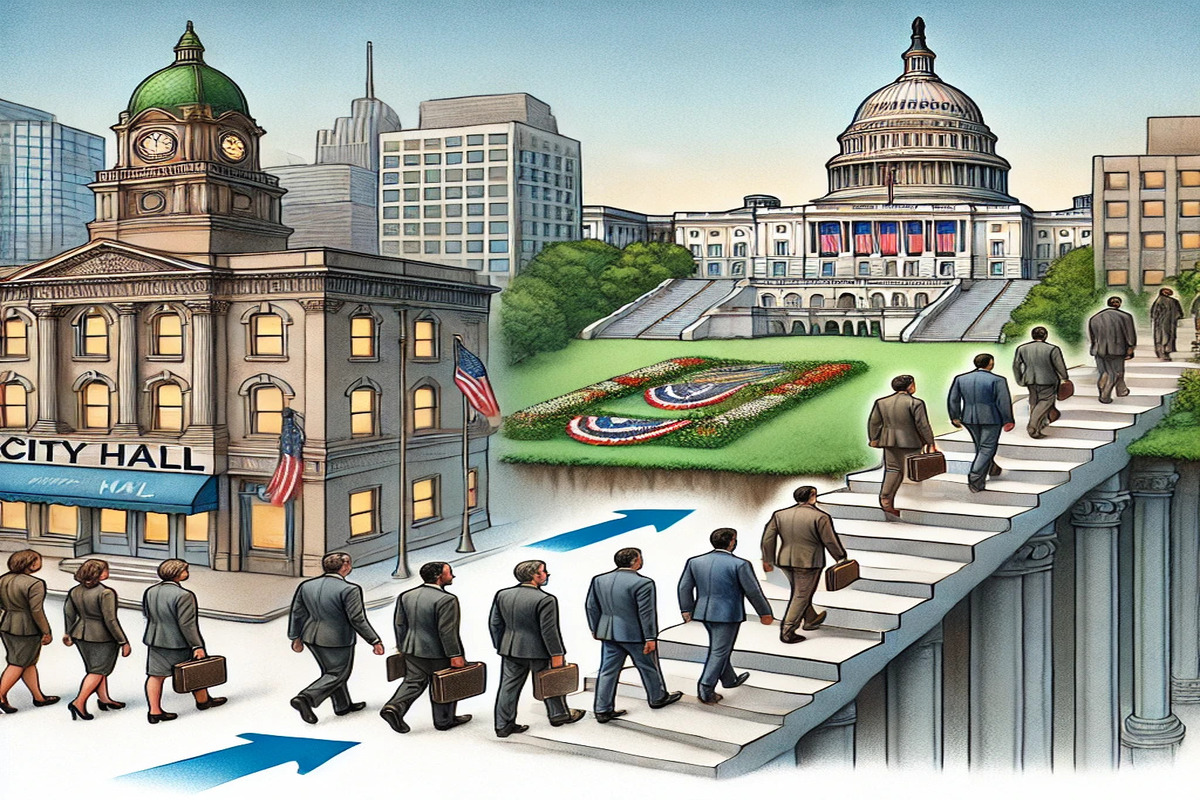The journey from local governance to national prominence is one marked by dedication, strategy, and an intimate understanding of public service. Read More
The transition from local to national politics typically involves a deepening of the issues that a leader has already been addressing. At the local level, politicians are directly connected to their constituents, dealing with day-to-day concerns and implementing policies that have immediate effects. This close connection to the community provides valuable insights into the challenges people face, making local leaders particularly effective when they move to higher office. For example, Barack Obama’s political career began at the local level when he served in the Illinois State Senate. His work on education, healthcare, and government transparency in Illinois laid the groundwork for his later campaign for the U.S. Senate and eventually the presidency. Obama’s ability to connect with voters on local issues and his experience in state politics provided him with the knowledge and credibility to pursue national office. Similarly, Mitch McConnell, one of the most influential figures in the U.S. Senate, began his political career as a judge-executive in Jefferson County, Kentucky. His role at the county level gave him a clear understanding of local government operations and the importance of building strong relationships with voters. This experience was instrumental in his successful run for the U.S. Senate, where he has had a significant impact on national politics, particularly in his role as Senate Majority Leader. Local political leaders who transition to national roles often do so by building on their successes and reputation at the local level. They leverage their accomplishments, community connections, and understanding of local issues to create a platform that resonates with a broader audience. For instance, Cory Booker, who began his political career as a city councilman and later as the mayor of Newark, New Jersey, focused on issues like affordable housing, crime reduction, and urban revitalization. His hands-on approach to tackling these challenges earned him national attention and helped him build a platform centered on social justice and economic opportunity. Booker’s success in Newark provided a strong foundation for his election to the U.S. Senate, where he continues to advocate for policies that address the needs of urban communities across the nation. Another example is Pete Buttigieg, who served as the mayor of South Bend, Indiana, before launching a bid for the presidency in 2020. Buttigieg’s work in transforming South Bend’s economy and revitalizing its downtown area showcased his ability to lead and innovate at the local level. His experience as a mayor, combined with his military service and education, allowed him to present himself as a forward-thinking leader with practical solutions for national challenges. Although he did not win the Democratic nomination, Buttigieg’s campaign catapulted him to national prominence and eventually led to his appointment as the U.S. Secretary of Transportation. While transitioning from local to national politics offers many opportunities, it also comes with significant challenges. Local leaders moving to national roles must navigate the complexities of federal governance, build coalitions across diverse constituencies, and often shift from a focus on specific local issues to broader national concerns. One challenge is the need to adjust to the slower pace and larger scale of federal government operations. Local governments tend to act quickly and decisively, whereas the federal legislative process is often more cumbersome and requires greater compromise and negotiation. Local leaders must also expand their policy expertise to address a wider range of issues that affect the entire country, not just their home communities. However, the skills developed at the local level—such as problem-solving, constituent engagement, and coalition-building—are invaluable in national politics. These leaders often bring a practical, results-oriented approach to federal government, which can lead to innovative solutions and effective policymaking. The transition from city hall to Capitol Hill is a path that many local political leaders have successfully navigated, leveraging their deep understanding of community needs and their experience in local governance to make an impact on a larger scale. The examples of leaders like Barack Obama, Mitch McConnell, Cory Booker, and Pete Buttigieg demonstrate that the skills and values honed in local politics can provide a strong foundation for national leadership. For aspiring political leaders, the journey from local to national office highlights the importance of starting where you are, understanding the needs of your community, and building a track record of success. The ability to connect with constituents, address their concerns, and deliver tangible results is what ultimately propels local leaders to the national stage. As these leaders move from city hall to Capitol Hill, they bring with them the experience and insights needed to shape policies that have a lasting impact on both their home communities and the nation as a whole. The Path from Local to National Politics
Building a National Platform from Local Success
Challenges and Opportunities in the Transition
Bottom Line: The Value of Local Leadership on the National Stage

From City Hall to Capitol Hill: How Local Political Leaders Transition to National Roles
The journey from local governance to national prominence is one marked by dedication, strategy, and an intimate understanding of public service. Read More
